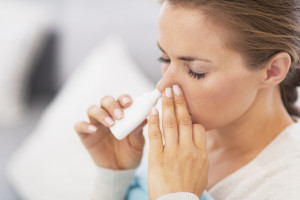By Helen Wang, PhD, LAc
 Spring is well underway in North Carolina…are you happy about it, or does the idea of oncoming seasonal allergies make you shudder with dread?
Spring is well underway in North Carolina…are you happy about it, or does the idea of oncoming seasonal allergies make you shudder with dread?
If you suffer from seasonal or chronic allergies, you are in good company. Hay fever, or allergic rhinitis, is the most prevalent chronic allergic disease in the US.
Studies suggest that up to 10% of adults and 40% of children in the US are affected by an allergic reaction to pollen, making allergic rhinitis one of the most common reasons for visits to primary care practitioners.
Acupuncture Helps Allergies
Here’s a best-kept secret … instead of relying on drugs, surgery or steroids, you can send allergy symptoms packing with acupuncture! Spring should be a time for fun and celebration, not sniffling, sneezing and watery eyes!
If you struggle with seasonal or chronic allergies, you may get significant relief from targeted, consistent, and evidence-based acupuncture sessions designed to relieve allergy symptoms such as nasal congestion and allergic rhinitis.
Recent randomized controlled trials have found that acupuncture used as an adjunct to routine care for allergic rhinitis has clinically relevant and persistent benefits and is cost effective. Such trials have found that acupuncture is effective in the symptomatic treatment of perennial (throughout the year) rhinitis. They have also found that active acupuncture is more effective than sham acupuncture in decreasing the symptom scores for persistent allergic rhinitis and increasing the symptom-free days.
No Silver Bullet
For the unfortunate millions who get allergic rhinitis and other seasonal and perennial allergies, there is no silver bullet that can treat each and every symptom. As a result of limited treatment options, many people resort to using an array of antihistamines, decongestants, and other treatments simultaneously, which can lead to a snowballing of undesirable side effects.
Acupuncture is another tool in an allergy sufferer’s toolbox. The treatment appears to be able to provide a large percentage of allergy sufferers with significant relief from uncomfortable symptoms. This has led the medical community to begin acknowledging that it is very promising for the treatment of seasonal and chronic allergy symptoms.
Acupuncture for Allergies Can Replace Medication
Even better, in some cases it appears that acupuncture treatment of allergies can replace—or reduce—the need for medication. This makes it a safe, viable option for patients looking for alternatives to traditional allergy treatment. And when acupuncture is used in conjunction with herbal formulas, the impact can profoundly improve the allergy sufferer’s quality of life.
At Acupuncture Balanced Health, we have first-hand experience with acupuncture treatment for seasonal allergies. Patients who receive treatment early in the allergy season do very well in our experience, and as spring turns to fall we generally recommend two to three acupuncture sessions. At the same time, we usually prescribe patients an herbal formula to help alleviate their symptoms.
Dietary Changes
Depending on our patient’s symptoms and health history, we also recommend supplements for patients to decrease allergy symptoms, support gut health and strengthen immunity. In some circumstances, we recommend slight dietary changes as well. Taken together, these treatments are often very effective in alleviating seasonal allergy symptoms.
In addition to providing ongoing allergy treatment and prevention, acupuncture sessions can result in immediate relief from existing allergy symptoms. We often see first-time allergy treatment patients leave our office feeling less stuffy, sniffly, and itchy.
Cumulative Effects
One of the amazing things about acupuncture is that the effects of treatment are cumulative, so a patient with seasonal allergies can go for several weeks without needing acupuncture. Combined with an herbal formula that can be taken at home, our patients have a full-spectrum solution to seasonal allergies and many of them make it through allergy season with little to no symptoms.
